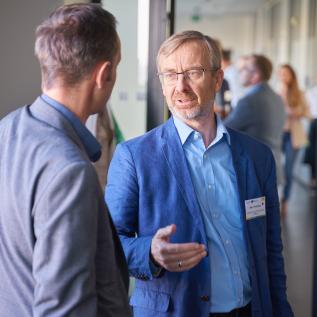The implementation of DRT-Services in Saarland's public transport system
On 28-29 November 2023, the Policy Learning Platform held an on-site peer review for the Saarland’s Ministry for the Environment, Climate Protection, Mobility, Agriculture and Consumer Protection, which requested advice regarding their policy challenge on the implementation of on-demand public transport in the region.
The majority of people in the region of Saarland relies on the use of car. The ministry's goal is to increase the attractiveness of local public transport through combined mobility offers and seamless travel chains. Political goal is to double the number of passengers using public transport by 2030.
To achieve this goal, the Ministry supports various mobility solutions, including demand responsive transport (DRT). There are Saarland-wide preparatory activities for DRT, including financial support of three pilot projects, to be implemented in 2024 and 2025, development of a common framework and an integrated software system.
Peers from across Europe
Alongside Katharina Krell and Magda Michaliková, our Thematic Experts on ‘Greener Europe’, five excellent peers participated in the peer review:
- Albert Guillaumes Marcer, Road Public Transport, Generalitat de Catalunya, ES
- Daniel Höfler, Leipziger Verkehrsbetriebe / Transport department of the city of Leipzig, DE
- Jackie Meally, General Manager, TFI Local Link Carlow Kilkenny Wicklow, IRE
- Noel O’Brian, Fleet Manager, TFI Local Link Carlow Kilkenny Wicklow, IRE
- Sérgio Caetano, Mobility and Transport Unit, Intermunicipal Community of the Region Coimbra, PT
Saarland has an opportunity to design a coherent framework for the implementation of DRT in the region and is already doing a great job with the development of a joint application, which will make the scheme user-friendly across the region. The recommendations of the peer review aim to further inspire and help the Ministry with the framework design.
Recommendations
- to complement formal public transport: it should be integrated in public transport, can make it more attractive and efficient, can bring mobility services to areas that are not suitable for traditional bus lines
- for social inclusion and territorial cohesion – DRT offers mobility for all areas and all citizens (elderly).
- to increase demand – it can increase passenger numbers
- Know your area and actual mobility data to design DRT schemes
- Have a multi-level (regional, district and municipal level) and a multi-actor (all mobility providers) governance approach
- Federal state should ensure a standardised solution – set framework, provide financial support and fund the development of a joint software, support could be built centrally to help municipalities make DRT plans and tender out services
- Local level (districts/municipalities) should: determine the objectives, collect local data, make citizen surveys to design routes, tender operations, take care of local communication
- Flexible agile system that can be adapted over time
- Start with a pilot to learn
- Start with an existing fleet before procuring expensive vehicles (several options including taxis, minibuses, etc.)
- Operational parameters: fixed vs. flexible approach, virtual bus stops, avoiding parallel routes
- Pricing of tickets as normal public transport
- User expectations: same day booking, possibility to book via app and phone call, simple and reliable booking system, punctuality, several payment methods, friendly drivers, accessibility (wheelchair users, strollers, baby seats)
- Devise a communication strategy – main objectives, target audiences, key messages
- Multi-channel marketing – focus groups, website, social media, printed materials, traditional media coverage, local influencers, mayors
- Targeted communication
- Create a strong brand
Download the report
Download the follow-up report of the peer review below.
Saarland_DRT_peer-review_final report.pdf
I would like to thank the peers who have come from far away just for this meeting to support us in our process. It was really exciting, and every project gave us something to take away. I am excited about the possibility for future collaboration and I am very happy with the outcome of the peer review.
I also want to thank Interreg Europe for inviting us, and also to Saarland for being a great host. You still have a lot of discussions ahead of you, but I hope you have taken some inspiration from what we have shared as well. I have learned a lot from this experience and have lot of ideas for improvement of our own system

Peer review publication
Find more information on the methodology and experiences of previous beneficiaries in our publication.

Apply for a peer review
Start your peer review application process today and find solutions to your policy challenge with our expert and peers!

